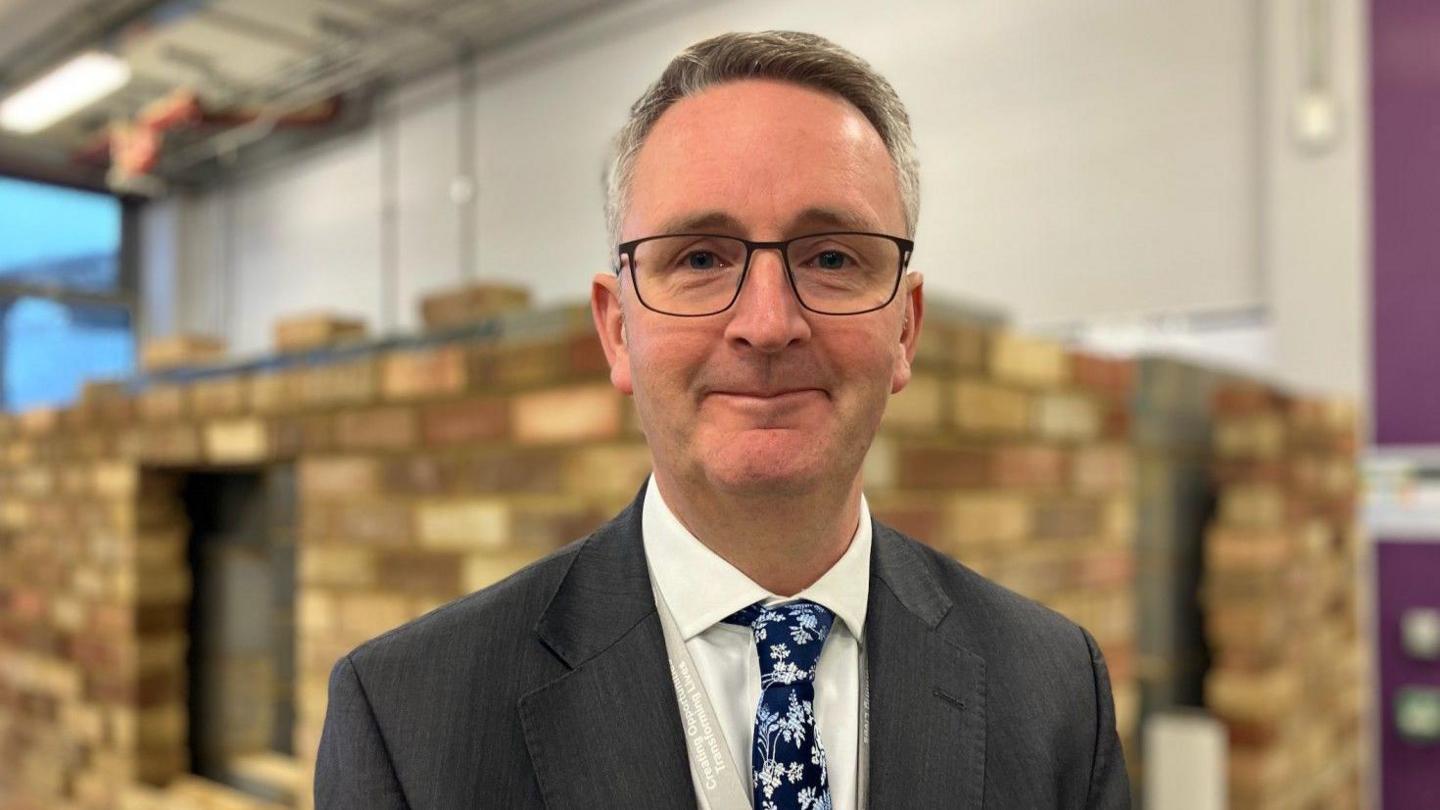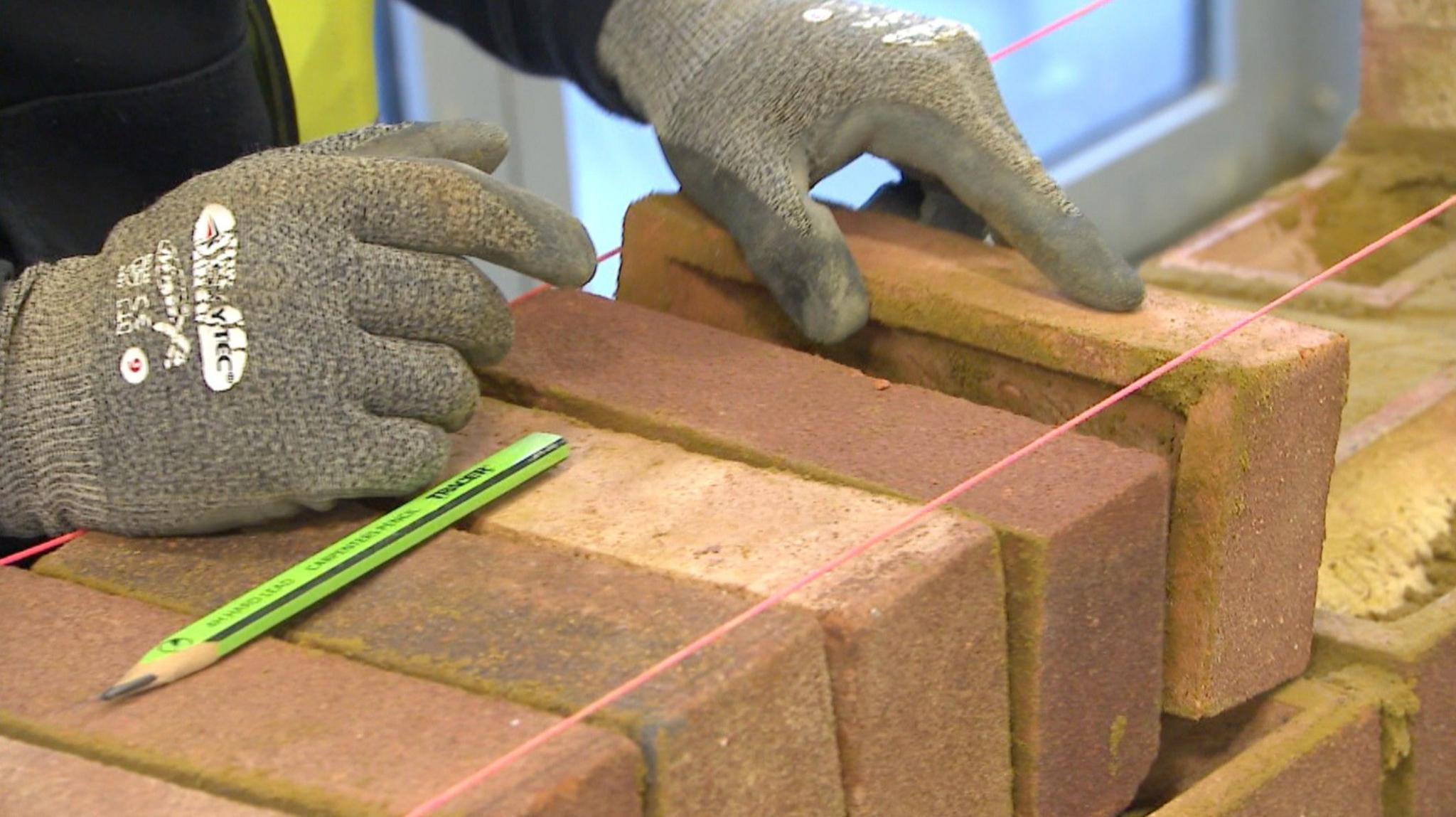Shortage of bricklaying teachers a 'perfect storm'

Simon Cook says a lack of funding for construction teachers is exacerbating a skills gap
- Published
The principal of a Kent college is calling on the government to invest in more bricklaying teachers to help train housebuilders.
The government has pledged to build 1.5 million homes in England by the next election, but there are fears there will be a shortage of skilled workers in the construction industry.
Simon Cook said courses like those at Mid Kent College helped to fill the gaps but claimed he could not recruit enough teachers to expand training opportunities, partly because he was unable to offer competitive wages.
The Department for Education said it was investing in education and reforming skills provision, with a retention incentive payment for early-career construction workers.
Mid Kent College offers vocational courses such as bricklaying, plumbing and carpentry for students aged 16-18, plus adult education and apprenticeships.
There are currently about 800 teenagers studying courses in construction skills at the college, but staff said demand was such that there could easily be 2,000 students.
The Construction Industry Training Board (CITB) estimated the government's homebuilding plans would require up to 159,000 more workers, which is in addition to the 250,000 already needed to meet the other forecasted building works through to 2028.

Hundreds are on the waiting list to study bricklaying at Mid Kent College, according to staff
Mr Cook said the challenge was finding people to teach courses, like bricklaying, as his budget limitations meant staff would earn "around £20,000 less" in the classroom than they might be able to earn on a building site.
"There is no way with the funding we receive we could ever compete with those salaries," the principal said.
"There is this perfect storm where we now have lots of organisations that need skilled and qualified staff in their workforce, but we don't have enough young people coming through those routes yet to be able to go into those [industries]. The cork in the bottle is organisations like ours."
He said the college could offer more courses if the government increased investment in teachers' wages.
"[We] can do that, are willing to step up and do that, are already doing that at scale for many of our local employers, but can do even more with the right investment."
'FE teachers earn less'
Mr Cook added the government gave academic teachers a pay rise shortly after the general election.
"A teacher in further education [FE] earns on average about £10,000 less than their equivalent teacher teaching in [an academic] school," he said.
The MP for Gillingham and Rainham, Naushabah Khan, has visited the college and said she would raise the issue with the government.
"The government has got ambitious plans to build 1.5 million new homes by the next Parliament, as well as huge infrastructure development. The core to that is going to be ensuring that we've got the homegrown skills to feed the next generation of workers in this country.
"I'm a big believer in investing in vocational skills, and I know the government is as well."
A Department for Education spokesperson said: "We are driving forward our plan for change by investing in education and reforming skills provision to foster growth and equip people with the tools they need to succeed in the future.
"To boost recruitment and retention of teachers, the targeted retention incentive now gives eligible early career construction teachers working in FE colleges up to £6,000 after tax annually.
"Additionally, the Taking Teaching Further programme supports those with relevant knowledge and/or industry experience to retrain as FE teachers, including those from construction."
The CITB said it was working with the government to meet demand.
A spokesperson said: "Most recently, in partnership with the government and National House Building Council (NHBC), we launched homebuilding skills hubs to deliver fast-track apprenticeships and high-quality training.
"Once fully rolled out, the hubs are estimated to deliver up to 5,000 new homebuilding apprenticeship starts and job opportunities each year. Up to 32 hubs will be launched by 2027."
Follow BBC Kent on Facebook, external, on X, external, and on Instagram, external. Send your story ideas to southeasttoday@bbc.co.uk , external or WhatsApp us on 08081 002250.